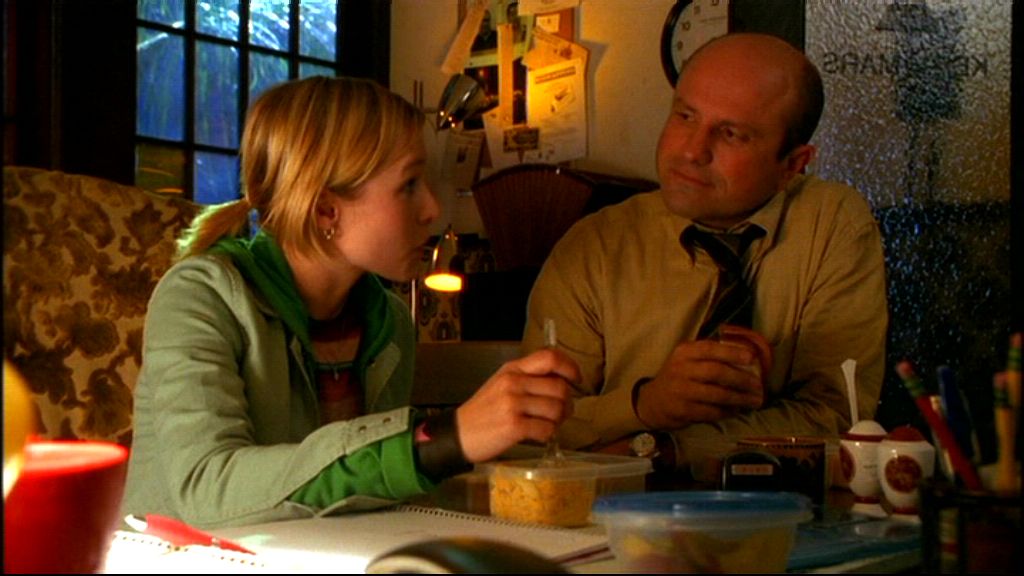The Psychology of Inspirational Women: Veronica Mars

 Welcome to our Psychology of Inspirational Women series, in which Licensed Clinical Psychologist Dr. Janina Scarlet talks us through the mindset of our favorite female characters. Check out other entries in the Psychology of Inspirational Women series: Storm, Korra, Carol and Michonne, Buffy, Katniss, Black Canary, and Grimm’s Juliette.
Welcome to our Psychology of Inspirational Women series, in which Licensed Clinical Psychologist Dr. Janina Scarlet talks us through the mindset of our favorite female characters. Check out other entries in the Psychology of Inspirational Women series: Storm, Korra, Carol and Michonne, Buffy, Katniss, Black Canary, and Grimm’s Juliette.
Spoilers for Veronica Mars follow.
If you’re a fellow Veronica Mars fan (a Marshmallow), then as soon as you saw the title picture, you probably started singing the theme song in your head:
“A long time ago, we used to be friends
But I haven’t thought of you lately at all…”
What makes this show so epic even years after it’s been cancelled? Simple – it touches on important life struggles of many young people.
The show opens with the lead character, Veronica Mars, going through what can only be described as a nightmare. Her best friend, Lilly Kane, was murdered. Her father, Keith Mars, who was previously the sheriff, accused Lily’s father of murder. Keith’s claims were not substantiated, however, and he lost his job, along with the respect of most people of Neptune City. Veronica stood by her father as her boyfriend, Duncan Kane, Lilly’s brother, broke up with her, and the entire school bullied her for her father’s accusations.

Veronica’s mother started abusing alcohol and left the family, without letting them know where she went. Finally, Veronica was drugged and raped by an unknown person at a party she attended and the police refused to help her because of their resentment toward her father.
Wow! That is A LOT for any one person to handle and all of this takes place over the course of a year, before the show begins. Veronica handles the bullying by either ignoring it or making snide remarks back toward her attackers. Understanding what it’s like to be bullied first hand, Veronica jumps to the defense of Wallace Fennell, a new student, who on his first day offended Eli (Weevil) Navarro, a biker gang leader.

Her heroic rescue in standing up to Weevil earns her a new best friend. Her being able to help Weevil himself when he gets himself into a sticky situation gets her the protection of the biker gang, which comes in handy when Logan, Lilly’s ex-boyfriend, begins harassing Veronica and tries to smash her car.
After Veronica’s father lost his job at the sheriff’s department, he became a private detective. Veronica soon started working for him and learned that she is quite good at playing Sherlock Holmes. Observant and keen, she helps her father with his cases and quickly becomes the school’s most important person as many people come to see her value as a private detective. Risking her own life, Veronica helps uncover the truth about many cases that stumped the local police.
As great as she is at solving mysteries, there are a number of occasions where Veronica is nearly injured, raped, or very nearly loses her life during her investigation. Interestingly, though she goes through numerous life-threatening and traumatic experiences, Veronica never develops major depressive disorder, nor does she ever meet the full criteria for posttraumatic stress disorder (PTSD). In fact, not everyone who experiences trauma ends up developing PTSD. Most people actually recover over time and while they might forever be changed by the traumatic event in some way, they might not develop PTSD in the clinical sense.
There are a number of factors that help individuals like build resilience that could prevent them from developing mental health disorders even in the face of traumatic experiences:
- Her relationship with her father. Veronica is very close to her dad. She supports him even when the entire town turns against him and he does the same for her. The two have a lot of respect for one another and trust each other. People who develop meaningful relationships with others and share themselves with others are more likely to be resilient in the face of stress and are less likely to develop mental health disorders.

- Her friendship with Wallace. Veronica quickly finds a best friend in Wallace and the two support one another in their adventures. Wallace is able to assist Veronica’s cases by using his position as the school aide. Having close friends is another resilience factor that can potentially prevent the development of mental health disorders like PTSD and depression.

- Her values. No matter what life throws at her, Veronica remains true to her core values – helping others, uncovering the truth, and standing up for what’s right. Because she is always working on solving some kind of a mystery, she is always engaged. Being engaged in meaningful activities causes our bodies to release dopamine and other “feel good” chemicals, creating a buffer against depression. It is for that reason that many psychologists encourage and assist their clients with depression on engaging in stimulating and meaningful tasks. Furthermore, solving crimes can feel like a game and a number of studies find that engaging in games and other playful behaviors can buffer against anxiety or depression or reduce these when they are present.
- Her openness about her feelings. Veronica isn’t one to shy away from her feelings. If she’s upset, she opens up about it to others. Feelings of rejection, heartbreak, worry, traumatic flashbacks, and painful losses can be excruciating and very often we might not want to talk or even think about these. Avoidance of anything that makes us feel sad, scared, or otherwise uncomfortable is called experiential avoidance. Scientists are finding that people who engage in experiential avoidance (people who run away from their feelings) are more likely to develop mental health and physical disorders than those who are open about their feelings.

It is highly likely that Veronica’s resilience factors played a large role in helping her better cope with everything she had been through. If anything, she appears to have better identified with her own core values after Lilly’s death, realizing the kind of person that she wants to become and what she wants to do for a living. This kind of positive transformation after a traumatic experience is called posttraumatic growth and is a phenomenon that many psychologists are interested in.
Because of her posttraumatic growth, Veronica was able to become the kind of hero that she turned out to be. She was then able to find Lilly’s killer, catch the serial rapist, and uncover many other mysteries that took place in Neptune City.

Dr. Janina Scarlet is a Licensed Clinical Psychologist, a scientist, and a full time geek. She uses Superhero Therapy to help patients with anxiety, depression, chronic pain, and PTSD at the Center for Stress and Anxiety Management and Sharp Memorial Hospital. Dr. Scarlet also teaches at Alliant International University, San Diego. Her book, Superhero Therapy, is expected to be released in July 2016 with Little, Brown Book Group.
If you would like to learn more about Superhero Therapy, please feel free to contact Dr. Janina Scarlet via Twitter @shadowquill, Facebook: https://www.facebook.com/Shadow.Scarletl, or via her website at www.superhero-therapy.com
—Please make note of The Mary Sue’s general comment policy.—
Do you follow The Mary Sue on Twitter, Facebook, Tumblr, Pinterest, & Google +?
Have a tip we should know? [email protected]